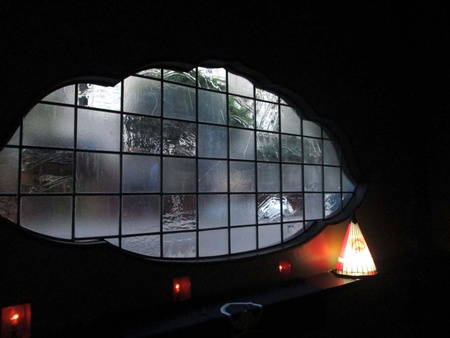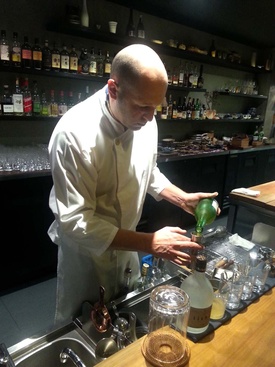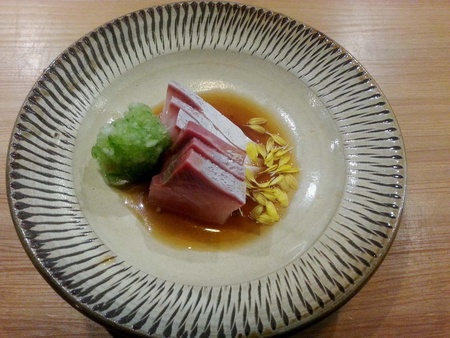A stop in Japan changed my life
Nowadays, the number of Japanese restaurants is increasing not only in Los Angeles but also on a global scale. However, the problem is the chefs. The number of Japanese chefs who have trained in Japan is limited. So, about 20 years ago, educational institutions that train Japanese chefs, mainly sushi chefs, began to be established in the United States. Since then, many graduates have gone on to work in the industry, but it is fair to say that there are still very few non-Japanese who have made a name for themselves as Japanese chefs.
Then, in the summer of 2016, the owner and chef of Shibumi, which was highly praised by restaurant critic Jonathan Gold, was revealed to be an American named David Schlosser. He described the restaurant as "giving you the illusion of tasting food in Tokyo." This shows how authentic Japanese cuisine can be enjoyed. The restaurant is located in downtown Los Angeles, which is undergoing redevelopment. I first visited in the fall of 2016, when a JETRO event was held where David showed off his skills using ingredients from Oita Prefecture. There was no conspicuous sign outside, and the restaurant was small with only four tables and a counter. At the event, grilled wagyu beef and yellowtail sashimi were served. I got the impression that it was authentic Japanese cuisine that followed the royal road without trying to be eccentric.
I requested an interview with David and was able to speak to him in December 2017, a year after the interview. David was born in Santa Monica, California. When asked what sparked his interest in Japanese cuisine, he told me the following:
"There are many health-conscious people in California, and I myself have always had a very healthy diet. The first time I visited Japan while traveling around Asia in 2000, it changed my life dramatically. I realized that Japan was a special place to me. I was particularly impressed by the people I met there, Zen, and the food."
Originally a French chef, David gained experience in Japanese cuisine in Tokyo and Kyoto, and after returning to the United States he worked as a chef at Urasawa, a high-end Japanese restaurant in Beverly Hills. In June 2016, he finally opened Shibumi.
As mentioned above, Shibumi was featured by Jonathan Gold shortly after its opening and was ranked second in Gold's list of the best restaurants in Los Angeles in 2016.

We want to serve authentic Japanese cuisine.
David has a rather critical view of the current boom in Japanese cuisine in America.
"Japanese food is no longer unusual for Americans. However, I think that the Japanese food served in America, especially sushi, has been altered to suit American tastes. I opened my restaurant with the desire to serve authentic Japanese food to Americans. That's why I don't serve sushi, and instead serve real-tasting Japanese food that is loved by Japanese people, rather than fusion food."
However, there are exceptions to the rule that sushi is not served, and they do offer pressed sushi, which is a common dish in the Kansai region. However, regular nigiri sushi, and unusual roll sushi such as California rolls, are not on the menu at this restaurant.
"Sushi is certainly recognized by Americans as a representative Japanese dish. However, I think more attention should be given to home cooking. It's not flashy, but the simple flavor of boiled vegetables is comforting. There are still many dishes that are unknown to many Americans, but that I would like them to know about. I would like to put those on the menu at my restaurant."
One dish that is not flashy but is comforting is the miso soup with sweet potato buns that David made himself, which consisted of buns made from sweet potatoes with shiitake mushrooms from Oita Prefecture, and topped with miso soup made with white miso.
"Thanks to the dried shiitake mushrooms used in the miso soup stock along with kelp, I was able to create a very rich and deep flavor," he said, and it left a strong impression as a dish that warms not only the body but also the soul. In addition, the grilled Bungo beef from Oita Prefecture, garnished with yuzu pepper from Oita, also brought out the umami of the ingredients.
When asked about ingredients from Oita, he immediately replied, "Seki horse mackerel and Seki mackerel. They are ingredients that Japanese chefs long for." He is not only an expert on Japanese cuisine techniques, but also on its knowledge, so it seems that he is not just an expert, but "Japanese people are the best."
It is true that Los Angeles is saturated with sushi restaurants. Shibumi, which does not serve sushi, is sure to attract more and more attention as a traditional Japanese restaurant that serves authentic Japanese home cooking. On the flip side, the fact that the owner is not Japanese could be seen as proof that Japanese cuisine has truly become global. We look forward to seeing the arrival of the second or third David Schlosser.
Shibumi official website: http://www.shibumidtla.com
© 2018 Keiko Fukuda







